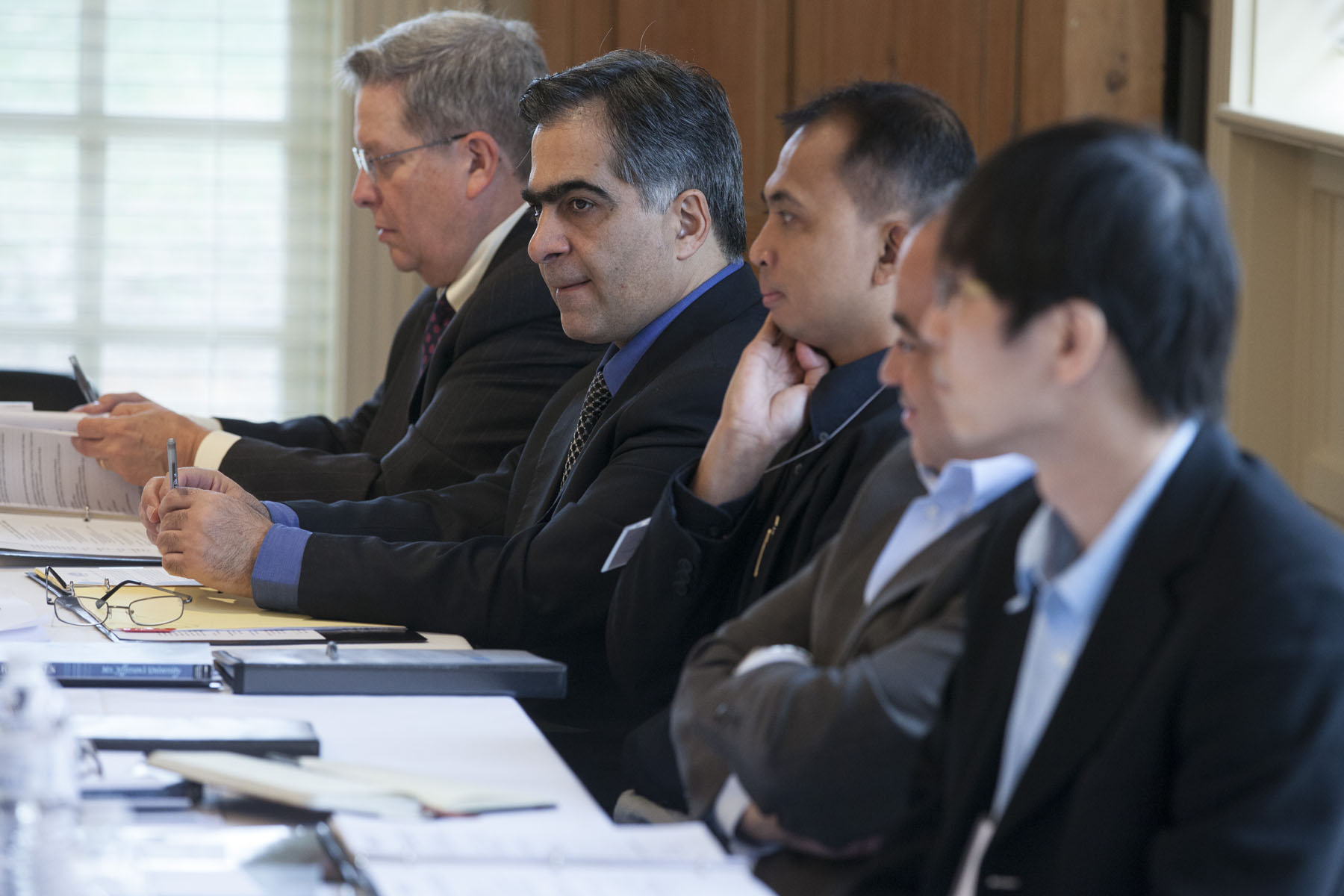In November, the U.N. General Assembly adopted a resolution on “Education for Democracy,” underscoring the importance of democracy education and raising its profile on the international agenda. On Monday and Tuesday, one of the key groups behind the resolution convened more than 25 leaders from six continents at the University of Virginia’s Morven Farm to discuss how best to follow up the resolution and further promote democracy education.
The Council for a Community of Democracies, a support organization for the Community of Democracies, a coalition of democratic countries established in 2000 to strengthen and deepen democratic norms and practices worldwide, called the conference. The Community of Democracies helped lead the 10-year push for the U.N. resolution, which establishes a process for regular U.N. reports on democracy education efforts in member countries.
One of the challenges for democracy education advocates will be to hold the U.N. and member nations to the commitments of the resolution, said Bob LaGamma, president of the Council for a Community of Democracies and one of the conference leaders, who spoke Monday morning in the Morven Meeting Barn.
“You picked the right place to come together to draft a strategy on democracy education,” said Jeffrey Legro, vice provost for global affairs at U.Va., as he welcomed the group to Morven. “This neighborhood has a lot of experience in drafting documents of democracy with our local Founding Fathers Jefferson, Madison and Monroe and their work on the Constitution and the Declaration of Independence.”
This area, recently dubbed “the Presidential Precinct,” also has some history with democracy education, Legro said. “The key to the design of U.Va. was not in the architecture, but in the philosophy. Jefferson believed you could not have democracy without an educated citizenry, to break down the false aristocracy, the false notion that some people are inherently more privileged, smarter than others, and they should rule those lesser beings. To break that down you needed to educate everyone, and that’s what the founding of the University of Virginia was all about.
“We recognize that democracy and education are always works in progress,” he added.
Inevitably, leaders at the U.N. and member nations have limited bandwidth and lots of competing priorities, so “sometimes nations forget about what they pledged to do,” said Steve Wagenseil, a former career State Department official who worked with the Council for a Community of Democracies to shepherd the resolution through several drafts before its eventual adoption in November.
Unlike many U.N. resolutions that have no life beyond the day of their adoption, Wagenseil said, the democracy education resolution created a structure for regular U.N. reports on democracy education.
The annual reporting process could prove crucial for democracy advocates in places like Iran, said Mariam Memarsadeghi, co-founder and co-director of the E-Collaborative for Civic Education, a U.S.-based nonprofit that has launched an e-learning resource to educate Iranians about democracy. Iranians log in to the resource with anonymous encrypted accounts, often after learning of the resource via Facebook, Twitter and other social media that Iran has thus far failed to totally control.
More than 1,500 Iranians, including many teachers, have used the resource, Memarsadeghi said. Iranian democracy advocates can report to the U.N. how the Iranian government discourages or actively works against democracy education efforts there. If such reports are eventually aired at the U.N., other nations and the international community may be able to pressure Iran toward reform.
“Democracy has a thousand faces. Everyone has to do it their own way,” LaGamma said. “It depends on the history of the people, the history of the country. The same goes for democracy education.”
That presents a challenge for promoters of democracy education, said education expert Matthew Hiebert, an employee of consulting firm Agriteam Canada who has studied democracy education for the council. The challenge in providing international support for democracy education is to develop a curricular template that is general enough to be broadly relevant, but specific enough to have practical value. Ideally, democracy education will help instill democratic culture and not just teach rote facts like identifying three branches of government, Hiebert said.
To be most effective, democracy education should be integrated into existing curriculum subjects and learning goals, because teachers around the world are already loaded down with learning goal targets they struggle to find time to address.
Democracy education advocates may make a stronger case by pointing to a specific successful example, said Dick Rowson, president emeritus of the council, who formerly worked in publishing and for Radio Free Europe. He suggested that example could be the Global Classrooms program, a pilot program in 80 high schools in the District of Columbia. The program teaches students – 80 percent of whom are from low-income families – about “global citizenship,” culminating in the students participating in a Model U.N. held annually at the U.S. Department of State.
Since the program focuses on global citizenship, at least in some countries it could be initiated by schools or local advocacy groups without pre-approval from a state or federal government, Rowson said. The need for such approvals has been a stumbling block in India, noted George Mathew, chairman of the Institute of Social Sciences in New Delhi.
Group leader Maria Leissner, secretary-general of the Community of Democracies and formerly Sweden’s ambassador-at-large for democracy, agreed with the suggestion.
Earlier in the morning, Robert Hunter, former U.S. Ambassador to NATO and an adviser to several presidential administrations, noted the “miracle” of meeting on democracy education with leaders from South Africa, Egypt, Chile, Mongolia, Poland, Nepal and Ghana – places that 30 years ago were not democracies.
Media Contact
Article Information
March 12, 2013
/content/international-democracy-education-advocates-convene-uva-s-morven-farm

